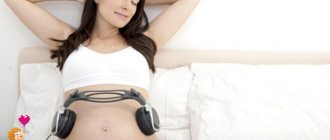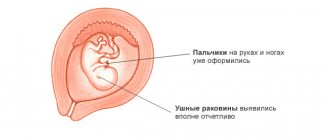Benefits of hugs for children
If in childhood a child was deprived of “hugs,” then as an adult, he gets a feeling of emptiness, and he has a fear of getting close to other people. Every child needs hugs. Although it is believed that girls need hugs and kisses more, little boys also want affection from their moms and dads.
As they grow up, priorities change. Teenage boys need more handshakes and pats on the shoulder. Teenage girls, on the contrary, need kisses and caresses even more. They need tactile contact like air. What do hugs give to a child?
- Stress resistance.
By hugging, a person receives endorphins, which give a feeling of happiness. That's why people hug each other when they're hurting and feeling bad. Children, by hugging, receive a charge of stress resistance, which will help them in the future. - Physical and mental health. Hugs are not a panacea. But it has been scientifically proven that a child who is hugged often grows up healthier and more resilient.
- Feeling of security . By hugging, the child feels protected, and this relieves anxiety.
It has been noticed that peoples for whom hugs are practically a ritual are more friendly, let alone children. One hug, lasting twenty seconds, can make any person, especially a little one, much happier.
How does a Caesarean baby feel?
According to the theory of matrices by Stanislav Grof, Caesar children, unfortunately, receive a truncated birth experience (they, as a rule, do not have the stages of cooperation and isolation). A caesarean baby is born without feeling any pressure from contractions, does not experience pain and makes no effort to squeeze through the birth canal - the baby is taken out of the mother’s belly practically asleep and not prepared to move into a new space... Such babies will need more attention in the future, especially in in terms of compensation for the lost first experience of the struggle for life and the feeling of euphoria from the achieved victory. What to do? As soon as the baby learns to crawl, play “tunnel” with him (for this you can stack several boxes or wrap the baby in a thick blanket and hug him tightly), helping him experience progress through the birth canal.
Why do we need hugs?
Every person intuitively understands that hugs are necessary. But it's not only that. Children need hugs for a variety of reasons.
If a child grows poorly, the reason may not be poor nutrition, but a lack of affection. Children deprived of tactile contact develop more slowly than their peers. When a person hugs, he produces the hormone of love - oxytocin, which has a great effect on the body, including promoting growth.
The more oxytocin, the faster a person grows and his immune system strengthens.
Tactile contact also contributes to the development of the child's mental abilities. It is no coincidence that children deprived of parental affection may lag behind their peers in development. But gentle touches for a few seconds ten times a day are enough and the child will develop better intellectually.
Any parent knows: when a child is hysterical, you need to pick him up or hold him close. Then he quickly calms down. However, not all mothers resort to this technique. Many people believe that it is better not to pay attention to the whims, that the child is manipulating them. But children often simply lose control of their emotions and cannot manage them. This is where adult help is needed.
In this case, hugs work better than any sedative. The fact is that in our body there are two separately existing branches - excitement and calm. They can be compared to the brake and gas pedals in a car. The child does not yet know how to control them properly, and he needs help - your hug. First, hug and reassure him, and then teach and educate him.
Young children have difficulty regulating strong emotions because their nervous systems are not yet mature enough. You need to know that during stress, the body produces a large amount of cortisol. As it circulates, it can harm the child and negatively affect physical and mental health.
Leaving a baby crying for a long time will not only have a negative impact on his health and development, but can also lead to depression when he becomes an adult.
“Hugs” not only allow kids to quickly regulate their emotions, but also give them optimism and cheerfulness and help them experience a feeling of love.
Hugs can heal a child. It has long been noticed that when a mother blows on her child’s abrasions and bruises and puts her hands on them, they quickly go away. American scientists have found that mothers' hugs have the same effect as painkillers. When blood was taken from premature babies in maternity hospitals, they tolerated the procedure much easier, having tactile contact with their mother.
Mom's hugs help to establish interaction with other people, increase the level of trust and reduce fear.

The third matrix is “collaboration”.
This stage corresponds to pushing and the birth of the baby. This is when the tiny little man receives a baptism of fire - the first lessons in the ability to fight for oneself, take risks and defeat opponents. What can the baby’s sensations be compared to? You overcome a tight tunnel, at the end of which you are put on a tight, tight collar of a sweater, which you need to pull to free your stiff neck, straighten your shoulders and breathe in the air... Wow! How can you help your baby? At this difficult stage, the mother needs to take positions that are comfortable for herself, and also remember the rules of deep breathing, listen carefully to the commands of the doctor and midwife in order to help the baby be born as quickly as possible and without the slightest injury. 14.00 Mom, it seems the door has disappeared! It's completely open. What begins behind it? New life? New unexplored horizons? In any case, I can only move there - there is no turning back. I'm getting ready for the final push. Where do I have such confidence and knowledge? But I know! You need to turn your head and determine the best position to begin action. You help me with all your might, mom: hanging on dad or squatting. How hard you push me! But I help myself too! My arms and legs have become stronger, because we trained them in your tummy for so many months. Now the test is coming for them - they will help me push off and crawl out. I can do anything! Forward!
14.30 Phew, finally you can take a break... You can relax for a while, but just a little: you need to get ready for the next breakthrough. I will look around again - examine the tunnel around me and find the best point for the next push.
14.45 And another push! We act synchronously and this makes progress much easier. I continue on my way forward. I feel like I'm moving forward at the speed of light, but in reality I'm only moving a little bit each time. How cramped I am!!! I wish I could be outside already! I move forward millimeters. I am full of determination and desire to find freedom!!! Mommy, help me!
14.55 Just a little more!.. Again, a couple of minutes for a break... You think only about me, mommy, and this gives me strength. I try to move well, and you are filled with pride for me! You hear that my heart is beating strongly and confidently - it gives you strength. I'm doing great and it's all because of your constant support and help. How I look forward to the moment when I finally see you, mom!
15.00 The last centimeters of the journey! I keep climbing! My head seemed to stretch out - it became easier to move in the tunnel. It turns out that if I slowly turn around, I will go through faster. I will resemble a screw that is screwed in. Thus, I was able to go around your bones and move further on my difficult path outward. And still I'm moving slowly, too slow it seems! 10 centimeters of tunnel is almost endless for me! I wish I could get outside faster! Forward, just forward!
15.10 Another jerk - and incredible relief... It seems that my head is already out.
Unimaginable! How can I free my shoulders? Probably we need to turn around a little again... It’s much easier this way. All!!! Can I hear myself?! How loud it is! 15.15 I don’t feel the body, it’s like a cloud - airy and light. I am in a halo of pure light! I did it! The whole world at my feet. I am human!!!
The importance of hugs and kisses in parenting
To properly raise a baby, you need to establish tactile contact with him even before birth. Already in the womb, the baby reacts to her voice, “responds” to strokes on the stomach. During this period, relationships are established that will later influence the child's development. If contact was constantly maintained with him, he will be born calmer and healthier.
A baby up to three months should be placed on the chest so that he can hear the heartbeat to which he is accustomed. There is no need to be afraid that the baby will interfere with household chores. Give him as much warmth and affection as possible. If a child does not receive enough of it from the person closest to him, he will grow up anxious and fearful, and will not be confident in himself. So pet him as much as possible. Every time you change diapers, touch your baby’s body with your fingers and massage.
After the birth of your child, try to spend as much time as possible with him, do not entrust the care of your blood to strangers.
If you don't have time to do household chores, let your relatives help you with this. But don’t shift the care of the child onto them. First of all, he needs his mother. And if you miss the situation, the baby will begin to perceive his grandmother or nanny as a mother, which is unacceptable.
There is no need to be shy about hugging and holding a child who is three or four years old, even older, to your heart. The child should always feel your love. It is necessary to observe the measure, especially when children grow up. But let your tactile contact take other forms: pinching, stroking, handshakes, pats. The child grows and moves away from his parents, but he always needs their hugs and their love.

The fourth matrix is “separation from mother.”
This stage occurs immediately, in the first moments, seconds, minutes after birth - and is designed to give the baby the basics of faith in his success, feelings of joy from victory, the experience of beauty and even future aesthetic feelings... What can the baby’s sensations be compared with? Imagine yourself, during a difficult and intense discussion of a problem, as the author of a brilliant idea... Or, for example, as a passenger in a cramped, stuffy bus, from which you finally, after 5 hours of bumpy travel, get off and find yourself on the sea coast... Incredibly blue sky, gentle sunny warmth on the skin and the sweet and salty aroma of the sea... In a word, catharsis and deep satisfaction. How to help the baby? An important emotional program is laid down if a newly born baby does not have to experience extreme extremes in the form of being suspended by the legs, loud voices and bright lights, slaps on the butt and a portion of cold air. The positive code will receive its logical conclusion if the baby, having got out of the mother’s belly, ends up on it and tastes the first drops of colostrum, hears the quiet gentle voice of the parents, feels gentle touches on the skin... To do this, discuss in advance (two to three months before the expected date) with the doctor, a scenario for the upcoming birth, focusing the doctor’s attention on placing the baby on your stomach and placing the baby on your chest immediately after birth.
16.16 Mom I love you! I'm lying on something warm and smelling seductively. Here you are hugging me again, your hands are just as gentle and careful. I feel your heartbeat, but much quieter than in your tummy, but still clearly - this is the best music for me! Your scent envelops me! Your cry of joy and happiness sounds in my ears...
16.18 I’m starting to settle in... I wonder where I am? How brightly everything glows! There are images and colored shadows all around. Only your face is clearly visible, mommy. It's probably because you're next to me. The world around me is filled either with silence or with a mixture of incomprehensible and often frightening sounds. I am confused by the abundance of new sensations and information that comes to me from everywhere. I'm trying to adapt. We are still connected to you, mommy, by the umbilical cord. Through it I receive oxygen from you. This is vital for me in the first minutes while I am just learning to breathe on my own. Now it’s not difficult anymore and I can handle it. It turned out that it was much more difficult for me to eat - colostrum is very tasty and aromatic, but it is very difficult for me to get it! But I'm trying!
16.25 Well, I’m completely independent... They cut the umbilical cord, put on a hat and wrapped it in something soft... Oh-oh-oh-oh, I wish I could get some sleep... Whose familiar voice is that? Dad! I recognized you! How good it is to lie in your arms... You smile, and tears shine in your eyes... Dad, everything is fine - I was born, here I am - your son! But can I sleep a little next to mommy?
Tactile games
Hugs alone are not enough. The more touches and other tenderness there are, the better. Games will help you with this, sometimes just a few minutes or seconds are enough.
- Drawing on the back. Draw on your child's back with your finger, and let him try to guess what you drew. It can be a figure or a letter. This way he will feel your touch and give free rein to his imagination.
- Dancing. Turn on some music and dance a little with your baby, holding him close to you. Let him feel your warmth and love.
- Hiding under the blanket. When putting your baby to bed, invite him to hide his favorite soft toy under the blanket. Find her and then kiss and hug her owner.











